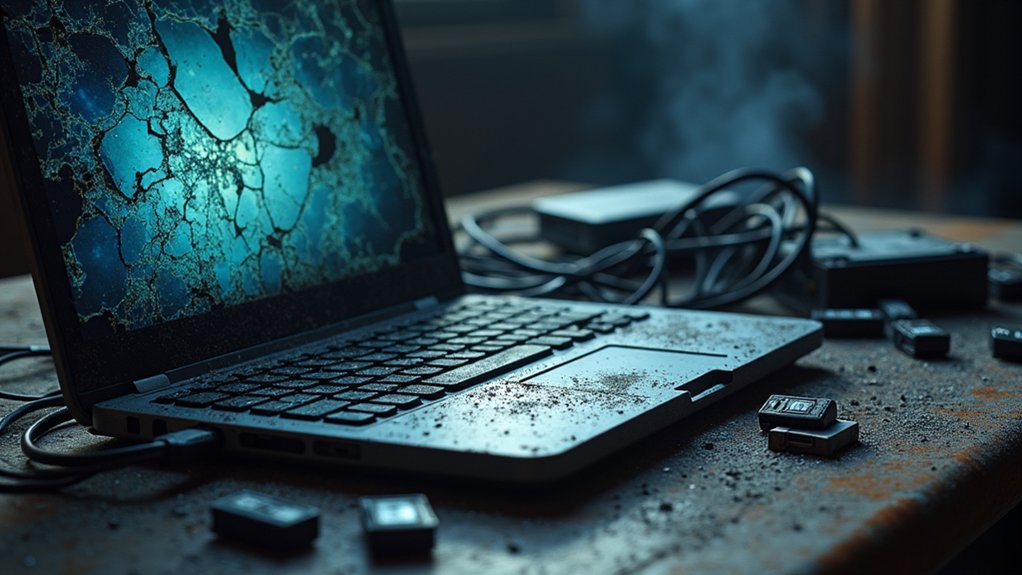
How to reset apple ID password
Unlock your Apple ID with ease—discover the essential steps to reset your forgotten password, but there’s one crucial detail you can’t miss.


When malware finds its way onto your computer, you’re dealing with more than just a minor hiccup. Malware can cause significant damage to computers. You may lose access to important files, notice your system slowing down, or even discover that sensitive information has been stolen. Malware can also drain your finances or disrupt services you rely on daily. But the real extent of the damage doesn’t stop there—there are hidden risks you might not have considered yet. Understanding how malware can damage computers is crucial for protecting yourself in this digital age. So, always be vigilant and ensure your systems are secure from the threat of malware.

When malware infiltrates your computer, it can swiftly lead to data loss and data corruption. You might find files mysteriously missing, documents turning unreadable, or software applications failing to perform as expected.
Malware can delete, alter, or overwrite essential data without your awareness. In some cases, it encrypts your files, rendering them inaccessible unless you pay a ransom.
This data loss and corruption can drastically affect your productivity and endanger your digital records. Stay vigilant against malware to protect your technology, apps, and smartphones from these threats.
Cybersecurity threats are a growing concern in today’s digital world, especially when it comes to unauthorized access to sensitive information.
Malware not only damages your files but also poses a serious risk to your private data. Cybercriminals can deploy malware to steal personal information, such as passwords, banking details, and sensitive documents.
Once they’ve unauthorized access, they might engage in identity theft, commit financial fraud, or sell your information on the dark web. This unauthorized access to sensitive information can remain unnoticed until it’s too late, causing lasting harm.
To protect yourself, it’s crucial to stay informed about the latest cybersecurity measures and ensure your devices, like smartphones and apps, are secure.
Always be vigilant to prevent unauthorized access to sensitive information.
Experiencing lag and sluggishness on your computer can often indicate the presence of malware.
Malware is notorious for consuming your system’s resources, leading to unexpected program freezes or crashes. You might experience slower boot times, delayed responses when opening files, or even random system restarts.
These performance degradation issues can significantly disrupt your daily tasks and make your device frustrating to use. Ignoring these problems can lead to even worse performance over time.
Malware isn’t just a nuisance that can slow down your computer; it poses a significant threat, especially when it comes to your financial security.
Cybercriminals deploy malware to specifically target your financial information. Once they get their hands on your banking credentials, credit card numbers, and account logins, they can wreak havoc on your finances. They can transfer funds, make unauthorized purchases, and even commit identity fraud—all under your name.
These attacks can lead to serious financial losses and long-term credit issues. It’s crucial to safeguard your technology and stay informed about the latest in apps, smartphones, and software to protect yourself from these threats.
When malware infects computers that support essential services like hospitals, power grids, or emergency response systems, it can wreak havoc on operations and jeopardize public safety.
Imagine the chaos caused by delays in medical care, unexpected blackouts, or failures in emergency response. Even a brief outage due to malware can lead to severe consequences, highlighting the critical need for robust cybersecurity measures. This makes malware not just a minor inconvenience but a significant threat to public well-being and daily life.
Protecting essential services from malware is crucial in our technology-driven world. By understanding the risks and implementing strong cybersecurity practices, we can safeguard these vital systems.
Stay informed about the latest technology trends and software updates to defend against the ever-evolving landscape of malware threats. Prioritizing cybersecurity ensures that our essential services continue to operate smoothly, keeping our communities safe and secure.
When malware infiltrates a single device, it seldom remains confined—rapidly spreading to other computers and networks. This expansion can occur through shared files, email attachments, or unsecured Wi-Fi connections.
As a result, you might inadvertently infect colleagues’ computers, family smartphones, or even your entire organization’s system. This swift spread of malware increases both the scale and complexity of the damage, making it much more challenging to contain and eliminate from affected environments.
In the realm of technology, understanding how malware propagates is crucial for safeguarding apps, smartphones, and software from potential threats.
Malware poses significant risks to your computer and personal information. This malicious software can lead to the loss of important files, slow down your computer’s performance, and even result in financial and identity theft. Malware is more than just a minor inconvenience; it can spread and disrupt essential services, putting others at risk.
To safeguard your digital life from the dangers of malware, it’s crucial to prioritize cybersecurity and stay proactive. By doing so, you can protect your data, devices, and yourself from the various threats that malware presents.

Unlock your Apple ID with ease—discover the essential steps to reset your forgotten password, but there’s one crucial detail you can’t miss.

Missing these top 5 password mistakes could put your accounts at risk—are you making one without even realizing it?

Discover the subtle clues that your iPhone may be infected and learn why ignoring these 7 signs could put your data at risk.

Uncover the safest way to remove a Trojan virus from your Mac before it causes serious damage—there’s one crucial step you can’t afford to miss.

Thinking your iPhone might be infected with malware? Discover the crucial manual checks you need to perform before your data is at risk.

Just noticed your phone acting strangely? Discover the five warning signs it might be hacked—number three will definitely surprise you.